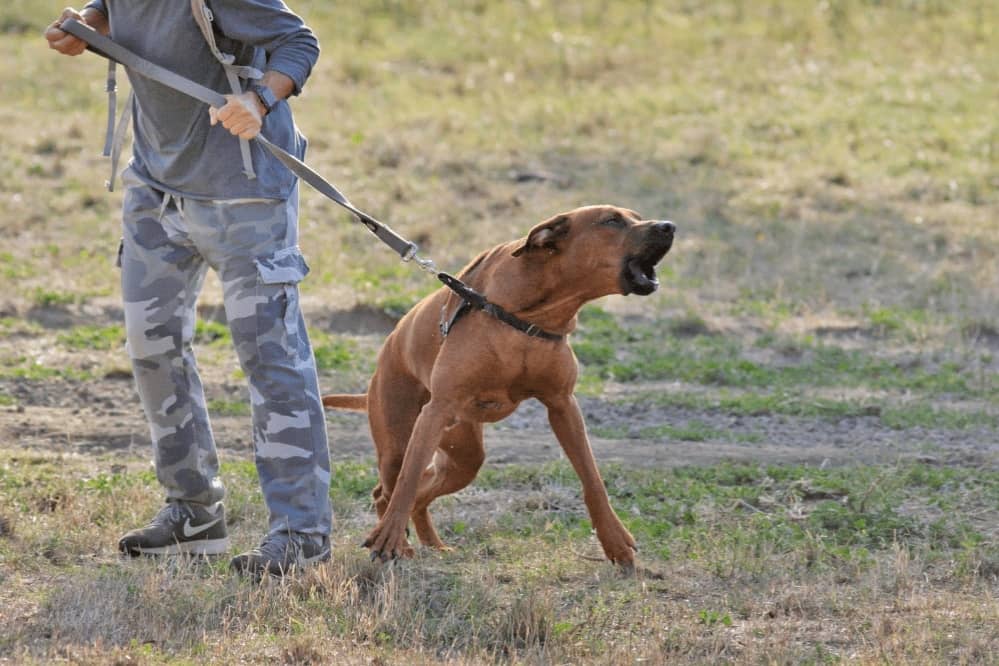It can go without saying that dogs are truly a beloved companion of mankind. For hundreds of years, people have been working with dogs to keep themselves safe, to get from one place to another, and to feed their families. While dogs may not play as much of a role in society as they used to in many parts of the world, there is no denying the fact that they are important members of your family. Unfortunately, dogs (as with many other animals) sometimes do things that they are not supposed to do. It can be incredibly problematic when your dog is acting up, especially when you have spent many painstaking hours trying to understand your canine friend.
As an example, one of the many problems that people run into with their dogs is the fact that dogs can and will growl at strangers, especially if the dog is prone to aggression, large, and hasn’t been socialized properly. This means that when you are taking your dog down the street on its morning walk, you may come across someone who your dog seems to immediately despise, and it begins growling immediately. This can be embarrassing in many different ways, especially if your dog is otherwise well-trained.
Speaking of training, one thing that you will want to keep in mind is that as long as you know what the root cause of your dog’s problems might be, you will have a chance to be able to fix it. If you come to learn that your dog is growling at people out of fear, you can begin to teach it not to be as fearful of strangers who will think nothing more of the dog than a fleeting “Cute dog!” statement. If your dog is growling because it smells another dog’s scent on a person, then you need to teach it how to socialize with others, so that it does not feel threatened by the mere scent of another dog.
To stop a behavior in any animal, not just in dogs, the best thing that you can do for yourself is going to move forward and research what may be going on in your dog’s head. You may be able to turn your dog’s fear into understanding, or at the very least, a neutral feeling. Understanding your dog’s reasoning is going to be the first step in teaching your dog not to stress about other people.
Understanding Why Dogs Growl
Before you can begin to wonder how to stop a dog from growling at strangers, you first have to understand why your dog is growling in the first place. This will help you get a sense of what is going through your dog’s mind, allowing you to come up with a plan to alleviate that stress. Dogs may growl for a variety of reasons, but if you have ever owned a chatty dog before, you will quickly learn that there are a fair few reasons why dogs will growl at other people.
The number one reason why dogs tend to growl at passerby and strangers is because your dog is fearful. One of the primary ways dogs express fear to other animals is to also assert dominance so that the other dog understands who is at the top. This type of growl is often accompanied with signs of aggression and it might escalate into a fight if you do not remove the dog from the fear-inducing situation.
Another quite common reason why a dog will growl at a stranger is if the dog you own is relatively territorial and expressive of that territorialism. Naturally, when a dog sees a stranger crossing into its territory, especially if the dog is a guard dog, the dog is going to become aggressive. Typically, these breeds need to stay outside and away from crowded areas for good reason, but there may come a situation where that is unavoidable. This is a harder behavior to correct, as dogs with territorial problems often have the tendency for those problems to be more deep-set into their pattern of thinking. It might be easier for you to try and adjust the path you take your dog outside to so that it doesn’t have to think about people entering into its “territory.”
Last, but most certainly not least, another reason why a dog will growl at a completely unrelated stranger is because the dog is in pain and it is worried the approaching stranger will exacerbate that pain, somehow. Dogs, as with many other animals, will growl when they are scared, but they will also growl even more loudly and intensely when they are in pain as a way to ward off threats that could cause them even more harm, even if those threats are perceived. Dogs share a relatively unique position with cats, as both dogs and cats are a combination of predator and prey. Dogs and cats can certainly hunt down other animals, meaning that to some extent, they are predators. At the same time, there are animals that will hunt dogs down if the moment is opportune. With this fact ingrained in the dog’s mind that if it does not find a way to fend off predators, then it will not survive, growling is one of their main ways to ward off potential threats.
These are all some of the most common reasons why your dog is going to begin growling at people who are otherwise complete strangers to you. This is obviously not going to be a comprehensive list on all the reasons why your dog will growl, but it is a good introduction to what you might be able to expect from your dog. Now that you have a firmer understanding of why your dog is growling at the passing strangers, you can begin working with your dog and teaching it. From here, you will want to begin learning coping strategies to help your dog not growl instinctively at passerby.
Helping Your Dog Not to Growl
First things first, now that you have some ideas as to why dogs have a tendency to growl at strangers, you can now begin teaching your dog not to do that. Especially for older pet owners, teaching a dog not to growl is a fairly simple task. You will always want to rule out any health conditions that may be leading to your dog being aggressive toward people. You cannot solve the root of your problem when there is a lot of other stuff in the way.
When your dog begins to growl, you will usually want to try and remove the dog from that situation so that both sides have some time to diffuse. If your dog is showing signs of fear about walking past a stranger, you may want to consider getting the dog to walk away and taking another path along its walk. Trying to get your dog to “push through it” to prove to it that nothing bad will happen is not something that will work.
If your dog is growling because it is being possessive over something, this is often a sign that you need to remove the object your dog is being possessive over. It can be incredibly difficult to distract your dog from the situation, but it will be well worth it in the end when your dog begins to settle down far more quickly than it normally would.
By making sure you have a firm understanding of what the root cause of this situation is, you will be able to rest assured knowing that everything that you do for your dog will be well worth it in the end. Your dog will appreciate the effort that you put into giving it a fulfilling and enjoyable life, even if it doesn’t fully understand what you are doing for it at that very moment.

